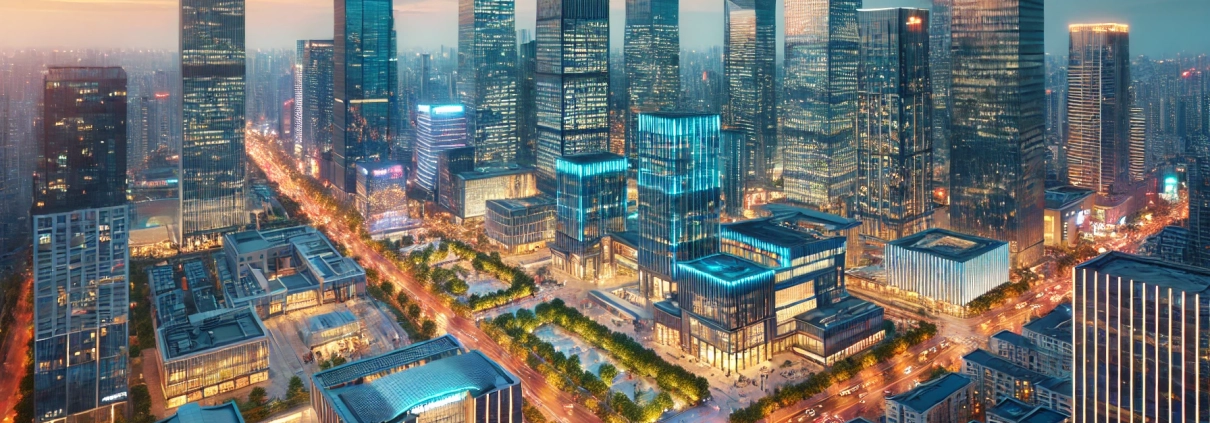Central Business District
The central business district (CBD) is typically the center of business and economic activity of a city. Land use is generally more dense urban infill with various land uses, including retail, office, hotel, government, and entertainment buildings, as well as higher density housing.
Putting ‘Central Business District’ in Context
Scenario Overview:
UrbanSky Developments, a real estate developer with a focus on urban core projects, has entered into a public-private partnership with the City of Riverton to develop a full-service hotel. The hotel, named the Metro Convention Hotel, will be built on city-owned land adjacent to the Riverton Convention Center, located in the heart of the city’s Central Business District (CBD). This development is part of a broader initiative to revitalize Riverton’s downtown area and attract more conventions and tourists to the city.
Context of the Central Business District (CBD):
Riverton’s CBD is the epicenter of the city’s economic and commercial activity, featuring a dense concentration of office buildings, retail spaces, government facilities, and entertainment venues. The area is characterized by high foot traffic and excellent public transportation links, making it an attractive location for both businesses and visitors. The City of Riverton has been actively working to enhance the CBD’s appeal through various urban renewal projects, with the new Metro Convention Hotel being a key component of this strategy.
Development Opportunity:
UrbanSky Developments recognized the potential in partnering with the city on this opportunistic project. The site’s prime location within the CBD, adjacent to the convention center, offers significant upside potential. The hotel is expected to serve not only as accommodation for convention attendees but also as a destination for business travelers and tourists visiting Riverton. The project is designed to include 300 luxury rooms, a rooftop bar with city skyline views, conference facilities, and direct access to the convention center.
Financial and Development Considerations:
Given the opportunistic nature of the project, UrbanSky Developments and the City of Riverton have agreed to share the development costs and potential profits. The city will contribute the land and certain tax incentives, while UrbanSky Developments will manage the construction and operation of the hotel. The estimated total development cost is $120 million, with projected annual revenues of $25 million once the hotel is fully operational. The high level of risk is mitigated by the hotel’s strategic location within the CBD and the strong demand drivers associated with the convention center.
Conclusion:
The Central Business District plays a crucial role in the success of the Metro Convention Hotel project. Its dense urban environment, combined with the proximity to key demand generators like the Riverton Convention Center, provides a compelling case for the development. This project highlights how a well-located site within the CBD can enhance the viability of an opportunistic real estate investment, particularly when supported by a public-private partnership.
Frequently Asked Questions about the Central Business District (CBD)
What is a Central Business District (CBD)?
The Central Business District is “typically the center of business and economic activity of a city.” It features dense urban infill with mixed land uses, including retail, office, hotel, government, entertainment, and higher-density housing.
What types of properties are commonly found in a CBD?
Common land uses include office buildings, retail spaces, hotels, government facilities, entertainment venues, and dense residential developments. The area often supports high foot traffic and transit accessibility.
How does the CBD impact real estate development opportunities?
The CBD’s high density, economic activity, and transportation access create strong demand for real estate. In the example, the Metro Convention Hotel project was considered viable due to “the hotel’s strategic location within the CBD and the strong demand drivers associated with the convention center.”
How did Riverton’s CBD support the hotel development?
Riverton’s CBD offered a prime location adjacent to the convention center, high visibility, and strong demand from business and tourism. The city’s active urban renewal efforts further enhanced the area’s appeal.
What is the role of public-private partnerships in CBD projects?
In the Riverton case, the city contributed land and tax incentives, while UrbanSky Developments handled construction and operations. This partnership shared risk and made the $120 million CBD project feasible.
Why is foot traffic important in a CBD?
High foot traffic in CBDs supports retail, hospitality, and entertainment businesses by increasing visibility and potential revenue. In Riverton, this made the CBD an ideal location for a full-service hotel.
What strategies are used to revitalize CBDs?
Cities may invest in infrastructure, public-private partnerships, and incentives to attract development. Riverton’s initiative to enhance its CBD included partnering on the Metro Convention Hotel to increase convention and tourism activity.
Click here to get this CRE Glossary in an eBook (PDF) format.

